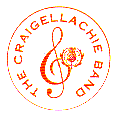|
Camberley Reel Club
|
Home
Library
|
Library - Running a Band
|
By Ian Muir, Leader of the Craigellachie Band
Published in Berkshire/Hampshire/Surrey Border Branch News, January 1994
 I sometimes wonder when I sit up on stage playing for a dance whether people
actually realise what goes into running a band. One sentiment frequently voiced
is usually along the lines of ‘…how nice it must be to be playing this kind of
music all the time!’ - it comes as quite a shock to some that in fact this is
only a hobby and that we all hold regular jobs.
I sometimes wonder when I sit up on stage playing for a dance whether people
actually realise what goes into running a band. One sentiment frequently voiced
is usually along the lines of ‘…how nice it must be to be playing this kind of
music all the time!’ - it comes as quite a shock to some that in fact this is
only a hobby and that we all hold regular jobs.
To play for a dance does not just involve turning up for the dance and playing.
There is much work that goes on before, and after. Preparation of the music may
take anything from one to three hours and probably at least two drafts before I
am satisfied that the music is suitable for the dances, that we will enjoy
playing, and hopefully, that the dancer will enjoy dancing and listening too.
The matching of original tunes to those that follow is most important if the
style, flow and feel of the dance is not to be interrupted. In nearly
twenty years of playing, there are some dances that I have only ever played for
once, some which I have never played for, and some which appear nearly every
week. Usually people like the named original tune for the dance but sometimes a
difficult decision has to be made with regards to this. How many people realise
that the tune we all associate with ‘Montgomeries' Rant’ is not in fact the
original but the alternative! Some dances share common originals, which I can
never understand! i.e. ‘Wind on Loch Fyne’ and ‘The Belle of Bon Accord’ use the
tunes of ‘Scotch Mist’ and ‘The Bonnie Lass of Bon Accord’, there are many more.
Some tunes are quite difficult and if it means the difference between a musical
mess or something suitable which contains all the lift and lilt which is needed
in good dance music the decision has to be made - someone invariably notices
either way and I have long since realised that you will never please everyone.
Playing at the correct tempo for the dance can also lead to all sorts of
problems. All members of the Craigellachie dance which I believe is quite
important as we can usually sense when things are not as they should be. It is
quite common, at the same dance, for some to think that the music is too slow,
for some just right, and for others, too fast! I am not so happy when everyone
thinks that it is their job to tell the Band - I firmly believe that this is the
role of the MC and/or the regular teacher of the club. John McDonald's
article
on the role of the MC has to be a must for any prospective MC to study as he
carefully makes this point about communications with the Band, pace of the
evening etc. I am sorry to have to say that sometimes the potential for a good
dance is ruined by a bad MC.
We always try to arrive at a dance with plenty of time to set up, play ourselves in
and get the balance right. Sometimes this is easy and sometimes we never really
get it right all night depending on the acoustic properties of the hall. Some
actually change with the number of people who get up for a particular dance.
Clearing away at the end can sometimes take time and usually there is a long
journey home which means that it is not uncommon to roll into bed at 2pm or
later, especially when you consider we probably left home at 4.30 in the
afternoon!
Why do we do it, you may ask?
Certainly the keeping up of correspondence, committing oneself sometimes two or
three years in advance, managing the band's finances, maintaining equipment and
instruments, arranging music, practising and finally playing for the dances are
hard work and time consuming (Craigellachie share all of these!) but I am sure
that the friendship, music-making, meeting other musicians and dancers, the
'buzz' when things are really going well at a dance, and the occasional early
morning 'motorway breakfast' on the way home ( ! ) are what keep us going and go
together to make a thrilling and rewarding hobby.
Back to top of page
Test
 I sometimes wonder when I sit up on stage playing for a dance whether people
actually realise what goes into running a band. One sentiment frequently voiced
is usually along the lines of ‘…how nice it must be to be playing this kind of
music all the time!’ - it comes as quite a shock to some that in fact this is
only a hobby and that we all hold regular jobs.
I sometimes wonder when I sit up on stage playing for a dance whether people
actually realise what goes into running a band. One sentiment frequently voiced
is usually along the lines of ‘…how nice it must be to be playing this kind of
music all the time!’ - it comes as quite a shock to some that in fact this is
only a hobby and that we all hold regular jobs.